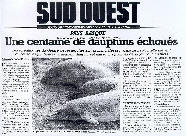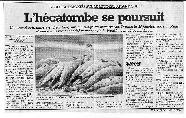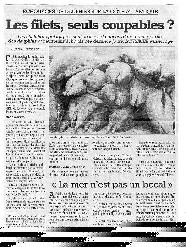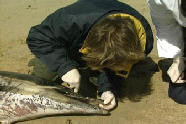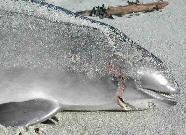EUROPEAN CETACEAN BYCATCH CAMPAIGN
"Man is but a strand in the complex web of life"
"Man is but a strand in the complex web of life"
The JNCC, adviser to the Government, agrees with the scientific studies.
UK Biodiversity Action Plan - mammals
ICES, adviser to the European Commission, also agrees with the scientific studies
ICES Advisory Committee on Ecosystems - 2001
January - May 2001: There was a significant increase in the number of dolphin strandings on the coasts of Cornwall, Devon, Jersey, Guernsey, and France.
This event was thought to be a result of entanglement in pair trawls, used to catch sea bass in the Western Approaches, as many of the bodies showed signs of incidental capture.
On March 30th 2001, a BBC programme featured an item on dolphin bycatch, during which Mr. Morley agreed that government
statistics showed that the number of dolphins found on the beaches of Cornwall, January - March 2001, had increased by 66% when compared with the figures for 2000, and that the increase could have been even greater, as many of the beaches where bodies of stranded dolphins are usually found, could not be visited due to Foot and Mouth restrictions.
UK Biodiversity Action Plan -
ICES, adviser to the European Commission, also agrees with the scientific studies
ICES Advisory Committee on Ecosystems -
January -
This event was thought to be a result of entanglement in pair trawls, used to catch sea bass in the Western Approaches, as many of the bodies showed signs of incidental capture.
On March 30th 2001, a BBC programme featured an item on dolphin bycatch, during which Mr. Morley agreed that government
statistics showed that the number of dolphins found on the beaches of Cornwall, January -
January 1st - February 5th 2002:
109 cetaceans, principally common dolphins, were found dead on the beaches of southern England.
January 20th - 28th 2002:
300 common dolphins were found dead on the beaches of the Atlantic coast of France.
109 cetaceans, principally common dolphins, were found dead on the beaches of southern England.
January 20th -
300 common dolphins were found dead on the beaches of the Atlantic coast of France.
ECHOUAGES MULTIPLES DE DAUPHINS
February 18th 2002: 150 dolphins stranded on one beach in France.
ECHOUAGE MASSIF DE DAUPHINS COMMUNS
In the first three months of 2002, over 1000 common dolphins, plus a significant number of harbour porpoises, long-
Many scientists estimate that this number is only 1% of the cetaceans, which actually died as a result of entanglement in pair trawl nets in the sea bass fishery.
Possibly, as many as 10 000 cetaceans, mainly common dolphins, died due to entanglement in pelagic trawl nets during the first three months of 2002.
Figures for the UK for the first three months of 2002 are not yet available, but for England and Wales, during the month of January, 1,994 cetaceans were reported as stranded.
Of the cetaceans, which were post mortemed, 79 % were found to have died due to entanglement in fishing nets.
The injuries sustained by cetaceans entangled in trawl nets are:
deep wounds to the head and body;
severed beaks, fins, and tails caused by fishermen using gaffs to remove the cetaceans from the nets;
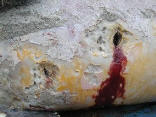
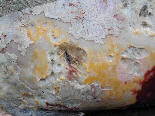
Click on either image shown above to enlarge
severe internal injuries including crushed organs;
puncture wounds made by fishermen so that the body will sink.
A number of post-
Top
